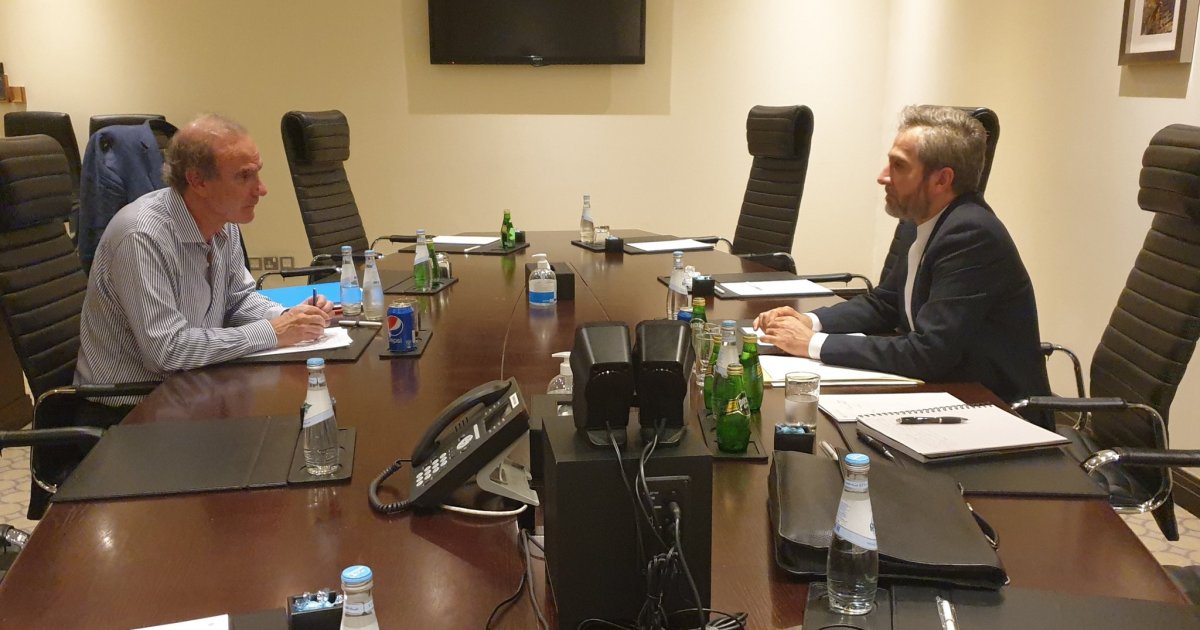Washington and the European Union confirmed the end of the indirect round of negotiations between Iran and the United States, which was held in Doha on reviving the 2015 nuclear agreement, without progress.
Negotiations were held on Tuesday and Wednesday in a hotel in the Qatari capital, at the initiative of the European Union, in an effort to break the deadlock in the 11-month rounds of talks that were suspended last March.
The European Negotiations Coordinator, Enrique Mora, was the mediator in this round, while Iran's chief negotiator Ali Bagheri and the US special envoy on Iran Robert Malley sat in separate rooms.
A US State Department spokesman said late on Wednesday evening that the indirect talks in Doha had ended, and expressed his disappointment that "Iran again refused to respond positively to the European Union's initiative, and therefore no progress was made," as he put it.
The spokesman added that the talks failed because "Iran has raised points unrelated to the JCPOA (the nuclear deal) and it does not seem ready to make the substantive decision on whether it wants to revive the agreement or bury it."
The Axios news website quoted a US official as saying that the indirect round of negotiations in Doha had not made progress, and that the Iranians had raised old issues that had been settled and other new issues not related to the nuclear agreement.
The US official indicated that the Iranians are the side that needs to make a decision on returning to the nuclear agreement, and they should have taken it months ago, according to the news site.
Prior to that, Enrique Mora, the European coordinator of the Vienna negotiations on the Iranian nuclear deal, said that the indirect US-Iranian talks in Doha ended without the hoped-for progress.
Mora added - in a tweet on Twitter - that he will continue to work with greater urgency to get the main agreement back on the right track, as he put it.
intense negotiations
On the other hand, the Iranian Foreign Ministry said yesterday that it had conducted intensive negotiations in Doha, and exchanged proposals with the opposite party on the outstanding issues.
And it added - in a statement - that the chief Iranian negotiator, Ali Bagheri, will communicate with the European coordinator, Enrique Mora, regarding the next stage of the negotiations.
According to the Iranian Foreign Ministry, it was agreed from the beginning that the Doha talks would be for two days.
Iranian Foreign Minister Hossein Amir Abdollahian had stressed Tehran's seriousness in reaching a good and lasting agreement during the Doha talks;
But he stressed that Iran will not back down from what it considers red lines.
For its part, the Iranian news agency "Tasnim" quoted informed sources as saying that the reason for the end of the talks in Doha is Washington's insistence on its previous positions, which do not guarantee the security of Iran's economic interests from the nuclear agreement.
The sources indicated that the United States is seeking to revive the nuclear agreement to restrict Iran's nuclear program, without guaranteeing Tehran access to the economic benefits of the agreement.
According to the Tasnim news agency, the European Union delegation also criticized the US position in not making efforts to revive the nuclear agreement.
In a related context, the Iranian Foreign Ministry announced that the chief Iranian negotiator, Ali Bagheri, met yesterday in Doha Sheikh Mohammed bin Abdul Rahman Al Thani, Deputy Prime Minister and Minister of Foreign Affairs of Qatar.
Bagheri stressed that Qatar's hosting of the nuclear talks is evidence of Doha's goodwill in adopting a policy of engagement and dialogue, stressing that Tehran supports the constructive role played by Qatar in regional and international files.
Qatari Foreign Minister Sheikh Mohammed bin Abdulrahman Al Thani also discussed, in a phone call with his Iranian counterpart, Hussein Amir Abdullahian, bilateral relations and the latest developments in the nuclear deal talks.
Country role
For his part, Qatari Foreign Ministry spokesman Majid Al-Ansari said - in an interview with Al Jazeera - that the Qatari role is to host the indirect talks between the United States and Iran.
He stressed that this is evidence of the parties' confidence in Qatar and the efforts they have made.
Al-Ansari added that the focus currently in this supplementary round is on restoring confidence between the parties, as it is the biggest challenge.
Before stopping last March, the Vienna negotiations made progress that brought the parties involved in the Iranian nuclear agreement close to completing an agreement, but they reached a dead end due to issues of contention between the Iranians and the Americans, especially with regard to Tehran’s demand to remove the name of the Iranian Revolutionary Guard from the list. Foreign Terrorist Organizations" approved by Washington.

